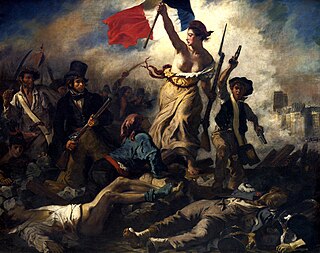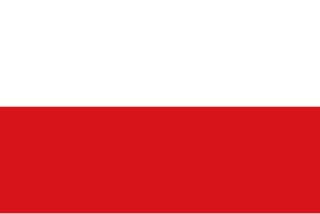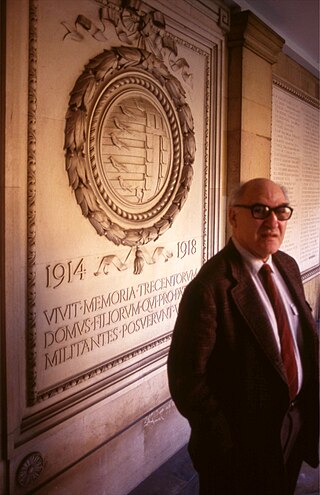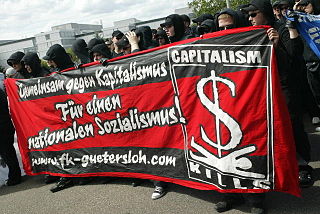Related Research Articles
Nationalism is an idea and movement that holds that the nation should be congruent with the state. As a movement, it presupposes the existence and tends to promote the interests of a particular nation, especially with the aim of gaining and maintaining its sovereignty (self-governance) over its perceived homeland to create a nation-state. It holds that each nation should govern itself, free from outside interference (self-determination), that a nation is a natural and ideal basis for a polity, and that the nation is the only rightful source of political power. It further aims to build and maintain a single national identity, based on a combination of shared social characteristics such as culture, ethnicity, geographic location, language, politics, religion, traditions and belief in a shared singular history, and to promote national unity or solidarity. Nationalism, therefore, seeks to preserve and foster a nation's traditional culture. There are various definitions of a "nation", which leads to different types of nationalism. The two main divergent forms identified by scholars are ethnic nationalism and civic nationalism.

Romantic nationalism is the form of nationalism in which the state claims its political legitimacy as an organic consequence of the unity of those it governs. This includes such factors as language, race, ethnicity, culture, religion, and customs of the nation in its primal sense of those who were born within its culture. It can be applied to ethnic nationalism as well as civic nationalism. Romantic nationalism arose in reaction to dynastic or imperial hegemony, which assessed the legitimacy of the state from the top down, emanating from a monarch or other authority, which justified its existence. Such downward-radiating power might ultimately derive from a god or gods (see the divine right of kings and the Mandate of Heaven).
Separatism is the advocacy of cultural, ethnic, tribal, religious, racial, governmental, or gender separation from the larger group. As with secession, separatism conventionally refers to full political separation. Groups simply seeking greater autonomy are usually not considered separatists. Some discourse settings equate separatism with religious segregation, racial segregation, or sex segregation, while other discourse settings take the broader view that separation by choice may serve useful purposes and is not the same as government-enforced segregation. There is some academic debate about this definition, and in particular how it relates to secessionism, as has been discussed online.

The Czech lands, then also known as Lands of the Bohemian Crown, were largely subject to the Habsburgs from the end of the Thirty Years' War in 1648 until the Austro-Hungarian Compromise of 1867. There were invasions by the Turks early in the period, and by the Prussians in the next century. The Habsburgs consolidated their rule and under Maria Theresa (1740–1780) adopted enlightened absolutism, with distinct institutions of the Bohemian Kingdom absorbed into centralized structures. After the Napoleonic Wars and the establishment of the Austrian Empire, a Czech National Revival began as a scholarly trend among educated Czechs, led by figures such as František Palacký. Czech nationalism took a more politically active form during the 1848 revolution, and began to come into conflict not only with the Habsburgs but with emerging German nationalism.

Gerhard "George" Lachmann Mosse was a German-American social and cultural historian, who emigrated from Nazi Germany to Great Britain and then to the United States. He was professor of history at the University of Iowa, the University of Wisconsin–Madison, and also in Israel, at the Hebrew University of Jerusalem. Best known for his studies of Nazism, he authored more than 25 books on topics as diverse as constitutional history, Protestant theology, and the history of masculinity. In 1966, he and Walter Laqueur founded The Journal of Contemporary History, which they co-edited.
Karl Wolfgang Deutsch was a Czech social and political scientist. He was a professor at MIT, Yale University and Harvard University, as well as Director of WZB Berlin Social Science Center.
Minority rights are the normal individual rights as applied to members of racial, ethnic, class, religious, linguistic or gender and sexual minorities, and also the collective rights accorded to any minority group.

Olgerd Ipolyt Bochkovsky was a Ukrainian sociologist, journalist, diplomat and political activist whose political writings were published in Ukrainian newspapers in Canada, Czechoslovakia, Poland and other countries. His selected writings have recently appeared in a three-volume edition. Born in a Polish-Lithuanian family in Dolynska village, Kherson Gubernia, he studied in St. Petersburg, where he was involved in the socialist movement. After the revolution in 1905 he immigrated to Austro-Hungary and settled in Prague. In 1909, he graduated from Charles University. At that time he was involved in the movement for abolition of the death penalty, and in this, as well as in the study of small nations movements, Tomáš Garrigue Masaryk was an inspiration for him. Before WWI Bochkovsky worked for several Czech journals, the most influential of which was Slovanský Přehled , and also for the Ukrainian newspaper Rada and the Russian-language Ukrainskaia zhizn’’. At that time he combined political activity in a milieu of immigrants from the Russian Empire with the study of the sociology of the nation. He focused on so called "non-historical / non-state nations" or "enslaved nations" of the Russian Empire.

The Illyrian movement was a pan-South-Slavic cultural and political campaign with roots in the early modern period, and revived by a group of young Croatian intellectuals during the first half of the 19th century, around the years of 1835–1863. This movement aimed to create a Croatian national establishment in Austria-Hungary through linguistic and ethnic unity, and through it lay the foundation for cultural and linguistic unification of all South Slavs under the revived umbrella term Illyrian.
National revival or national awakening is a period of ethnic self-consciousness that often precedes a political movement for national liberation but that can take place at a time when independence is politically unrealistic. In the history of Europe, national revivals are most commonly associated with the period of romantic nationalism that started in the 18th and 19th centuries.
European nationalism is a form of pan-nationalism based on a pan-European identity. It is considered minor since the National Party of Europe disintegrated in the 1970s.

Polish nationalism is a nationalism which asserted that the Polish people were a nation and which affirmed the cultural unity of Poles. British historian of Poland Norman Davies defines nationalism as "a doctrine ... to create a nation by arousing people's awareness of their nationality, and to mobilize their feelings into a vehicle for political action."
The European Social Movement was a neo-fascist and Europe-wide alliance set up in 1951 to promote pan-European nationalism.

Hagen Schulze was a German historian who held a position at the Free University of Berlin. He specialized in early modern and modern German and European history, particularly in comparative European nationalisms.
Cultural nationalism is a term used by scholars of nationalism to describe efforts among intellectuals to promote the formation of national communities through emphasis on a common culture. It is contrasted with "political" nationalism, which refers to specific movements for national self-determination through the establishment of a nation-state.
Left-wing nationalism or leftist nationalism is a form of nationalism which is based upon national self-determination, popular sovereignty, and left-wing political positions such as social equality. Left-wing nationalism can also include anti-imperialism and national liberation movements. Left-wing nationalism often stands in contrast to right-wing politics and right-wing nationalism.

Autonome Nationalisten are German, British, Dutch, and to a lesser degree Flemish, nationalists, who have adopted some of the far-left and antifa's organizational concepts, demonstration tactics, symbolism, and elements of clothing, including Che Guevara T-shirts and keffiyehs. Similar groups have also appeared in some central and eastern European countries, beginning with Poland, the Czech Republic, Ukraine, Romania and Greece and others.

Siniša Malešević, MRIA, MAE is Full Professor and Chair of Sociology at the University College, Dublin, Ireland. He is also a Senior Fellow and Associate Researcher at Conservatoire national des arts et métiers (CNAM), Paris, France.
Stefan Berger is the Director of the Institute for Social Movements, Ruhr University Bochum, Germany, and Chairman of the committee of the Library of the Ruhr Foundation. He is Professor of Social History at the Ruhr University. He specializes in nationalism and national identity studies, historiography and historical theory, comparative labour studies, and the history of industrial heritage.

Joseph Theodoor "Joep" Leerssen is a Dutch comparatist and cultural historian. He is professor of European studies at the University of Amsterdam, where he also holds a Royal Netherlands Academy Research Professorship. He was awarded the Spinozapremie in 2008.
References
- ↑ Bakke, Elisabeth; Breuilly, John; Hutchinson, John; Kolář, Pavel; Kriel, Mariana; Leerssen, Joep; Malečková, Jitka; Malešević, Siniša; Řezník, Miloš; Núñez Seixas, Xosé M; Šima, Karel (2022). "Symposium for Miroslav Hroch". Nations and Nationalism. 28 (3): 737–759. doi:10.1111/nana.12851. hdl: 1887/3448267 . ISSN 1354-5078. S2CID 249004221.
- ↑ "Prof. PhDr. Dr.h.c. Miroslav Hroch, DrSc". Charles University in Prague.
- ↑ "Honorary doctorates - Uppsala University, Sweden".
- ↑ Salva, Lon (8 January 2013). "1.2 theories of nationalism". SlideShare.net. Retrieved 21 February 2014.
- ↑ "What is Nationalism?". The Nationalism Project. Retrieved 21 February 2014.